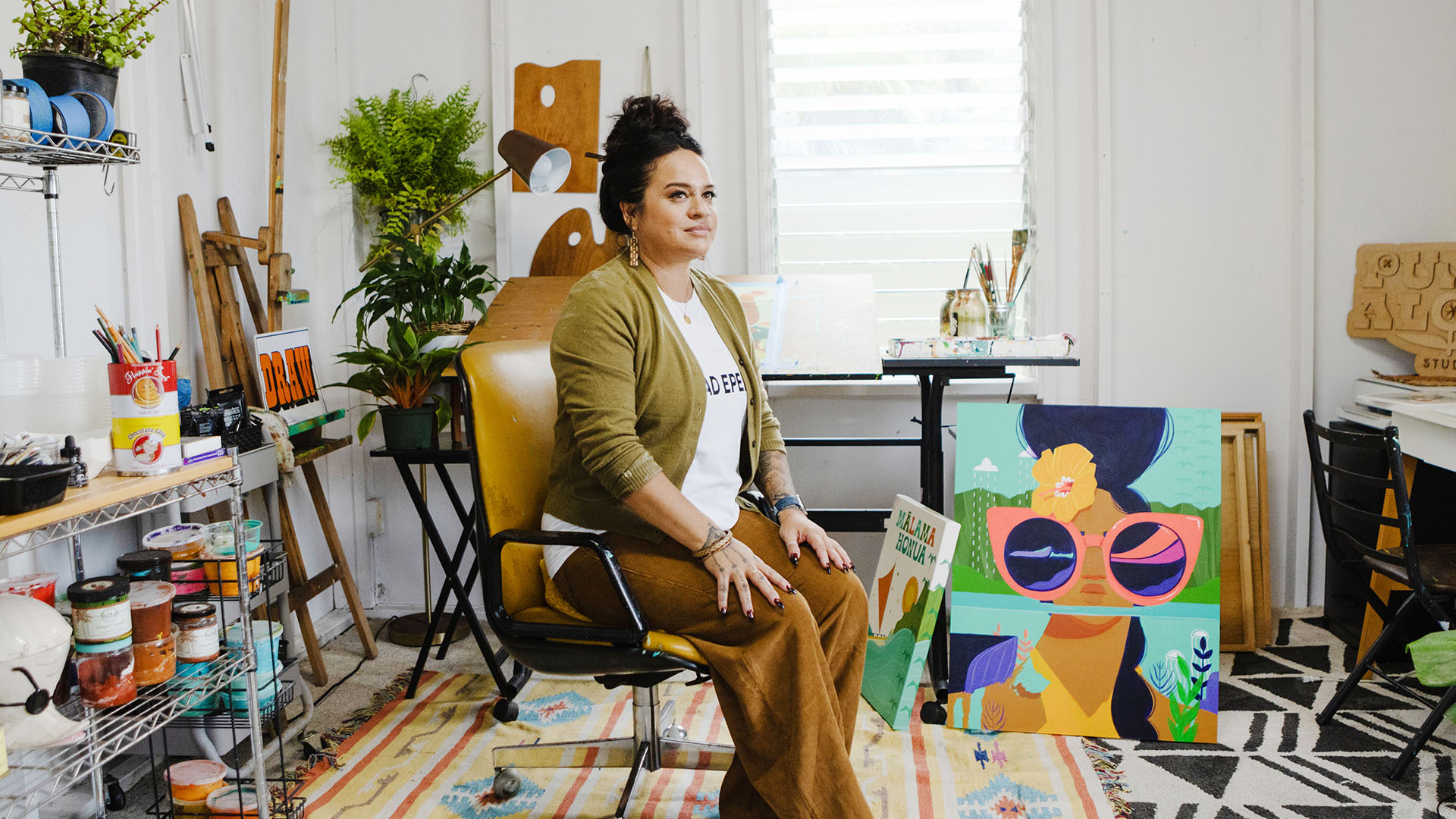After years of relying on commissions and collaborations, Kailua-born illustrator Shar Tuiasoa is telling her own story.
Images by Will Matsuda
In the pictorial realm of Shar Tuiasoa, curvaceous Pacific Islander women take up space. Here, in a multiverse of her making untainted by exploitative forces, a Polynesian Barbie world awaits, where girls lick shave ice like it’s nobody’s business, a lady longboarder casually hangs ten, and a curious swimmer examines a floating jellyfish, her hair trailing with buoyant thickness. In their totality, this fantasia of representation is saying something, whether you hear it or not.
So is Tuiasoa, the multihyphenate creator of Punky Aloha Studio, an illustration brand of freelance and artistic work based out of Tuiasoa’s home studio in Kailua, Oʻahu. When I meet the muralist, illustrator, and children’s book author at a Kailua coffee shop, on a rainy November day, she glides through the door with her hair swept into an immaculate tita bun, sporting a cozy gray sweatshirt that declares “Free Pasifika” in hot pink letters. Upon settling into her seat, she promises she didn’t intend to coordinate her attire with the coinciding Māori protests against a bill that would diminish aboriginal rights in Aotearoa, but something tells me she didn’t even have to think about it. Like her work, Tuiasoa’s way of life is so immersed in rendering the existence of Polynesian women that advocating for their livelihoods (even if it is just a sweatshirt) comes as second nature.
This isn’t a surprise given that Tuiasoa started Punky Aloha in 2018 in reaction to not seeing herself reflected — neither her Tongan heritage nor coconut tree climbing childhood — in the artwork springing up around Kailua. “We have to push back when there are so many new things coming in that make you feel like you’re a little less at home,” she says, alluding to the creeping gentrification and shifting demographics of her once-quaint hometown. “With me, it’s just pushing back by creating artwork that reminds us of who we are and that we do belong here and that we can feel empowered here.”
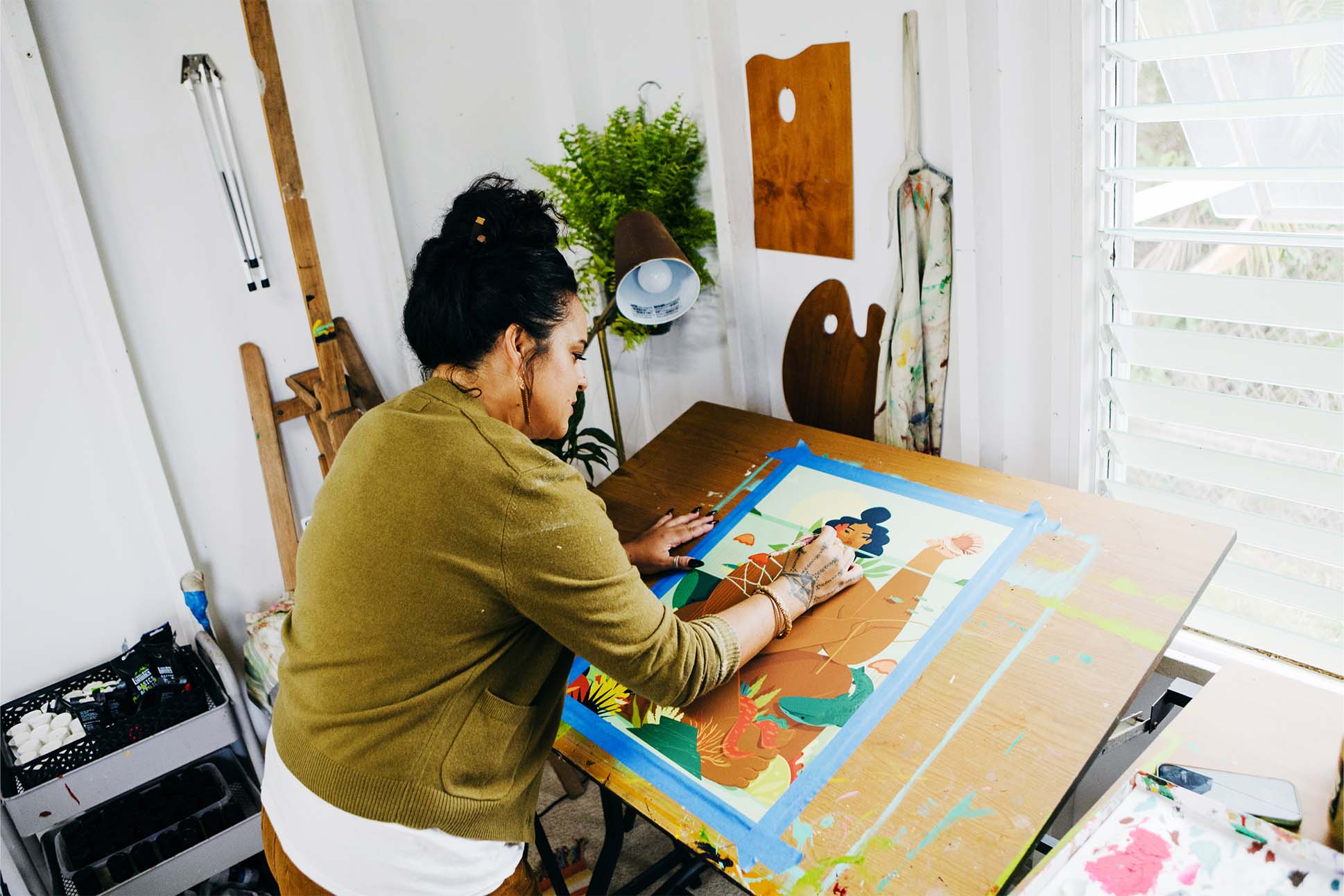

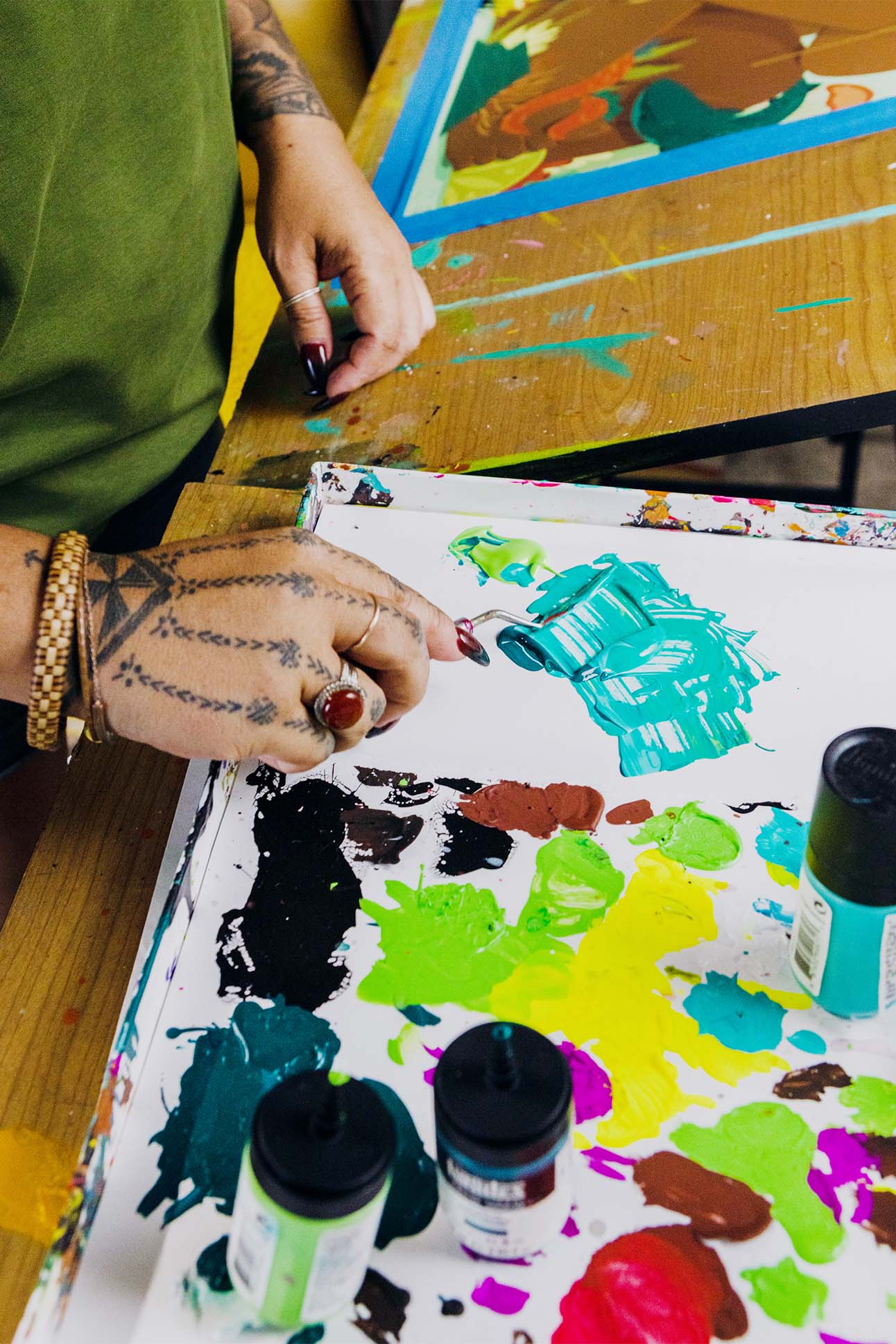

Tuiasoa started out by collaborating with small local businesses like illustrating wrappers for Mānoa Chocolate, a bean-to-bar chocolatier, and spray painting massive murals in Kakaʻako for Worldwide Walls, an international arts festival celebrating local talent. Eventually she booked “bucket-list” clients creating Disney postcards for the Epcot’s International Festival of Arts, a New York Times editorial illustration, and a yet-to-be-seen wrap-around design for an Alaska Airlines plane. Her contributions to these commercial enterprises bring Polynesian women to the foreground, their unapologetically abundant hair adorned with lilikoʻi lei poʻo and lau hala hats. “Having Pasifika characters and artwork put on a global scale or a national scale, that’s extremely important,” Tuiasoa says. “Having eyes on that, having girls see that there’s a woman illustrator who is from their same background out there doing stuff — I think that is meaningful. That still feels very community-driven.”
But amid the applause of representation, Tuiasoa sometimes worries about being boxed in, or worse, being tokenized for corporate diversity initiatives. She feels a responsibility to highlight the hardships that can come with being a Polynesian woman, but also the joy that is embedded within this identity. And while she has a lot of opinions about occupation and colonialism, cultural losses, and accountability, her work veers from righteous anger, opting instead to create a world that is sovereign from any colonial forces. “A lot of my artwork does strive to shine a life on the Pacific and Pacific Island cultures in a way that’s more of me wanting [people] to see us as equals or see us as just existing,” she says.
For Tuiasoa, illustrating her Polynesian wāhine engaging in the most mundane of activities, like riding a bike or enjoying a cup of coffee, is a powerful statement in its own right. While Tuiasoa has familial connections to Tonga — her father was raised in Haʻakame, a small village on the island of Tongatapu, where she still has family — Hawaiʻi is what she knows, and Hawaiian culture is what she is familiar with. As a result, her artwork is a collaboration of Pasifika cultures, a knowing nod to the Tongan and Fijian scholar Epeli Hauʻofa. Tuiasoa, who carries a copy of We Are The Ocean: Selected Works wherever she goes, channels Hau‘ofa’s vision of Oceania as vast and interconnected, through Punky Aloha’s colorful mishmash of a cross-pollinating Pasifika linked by the ocean rather than divided by it.
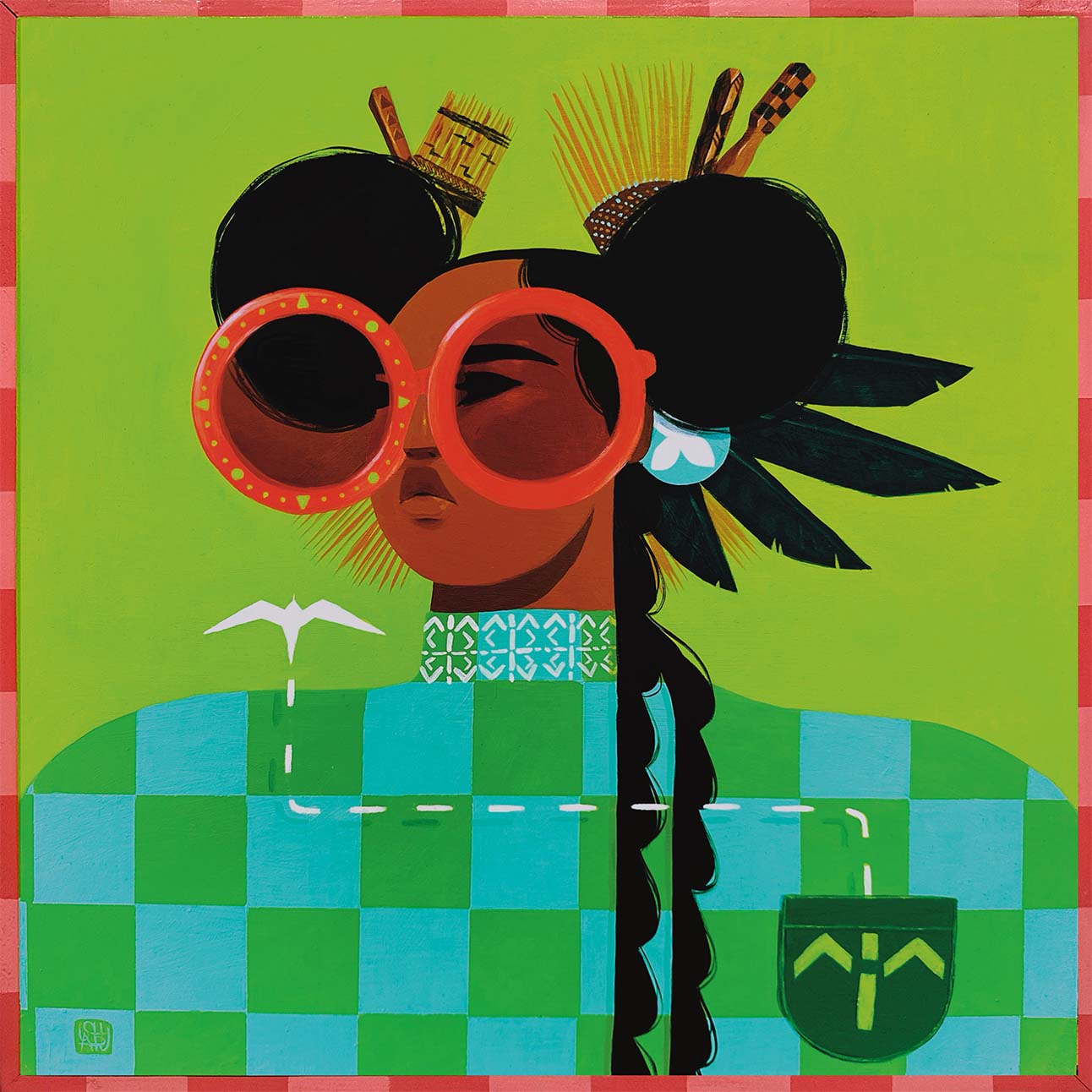

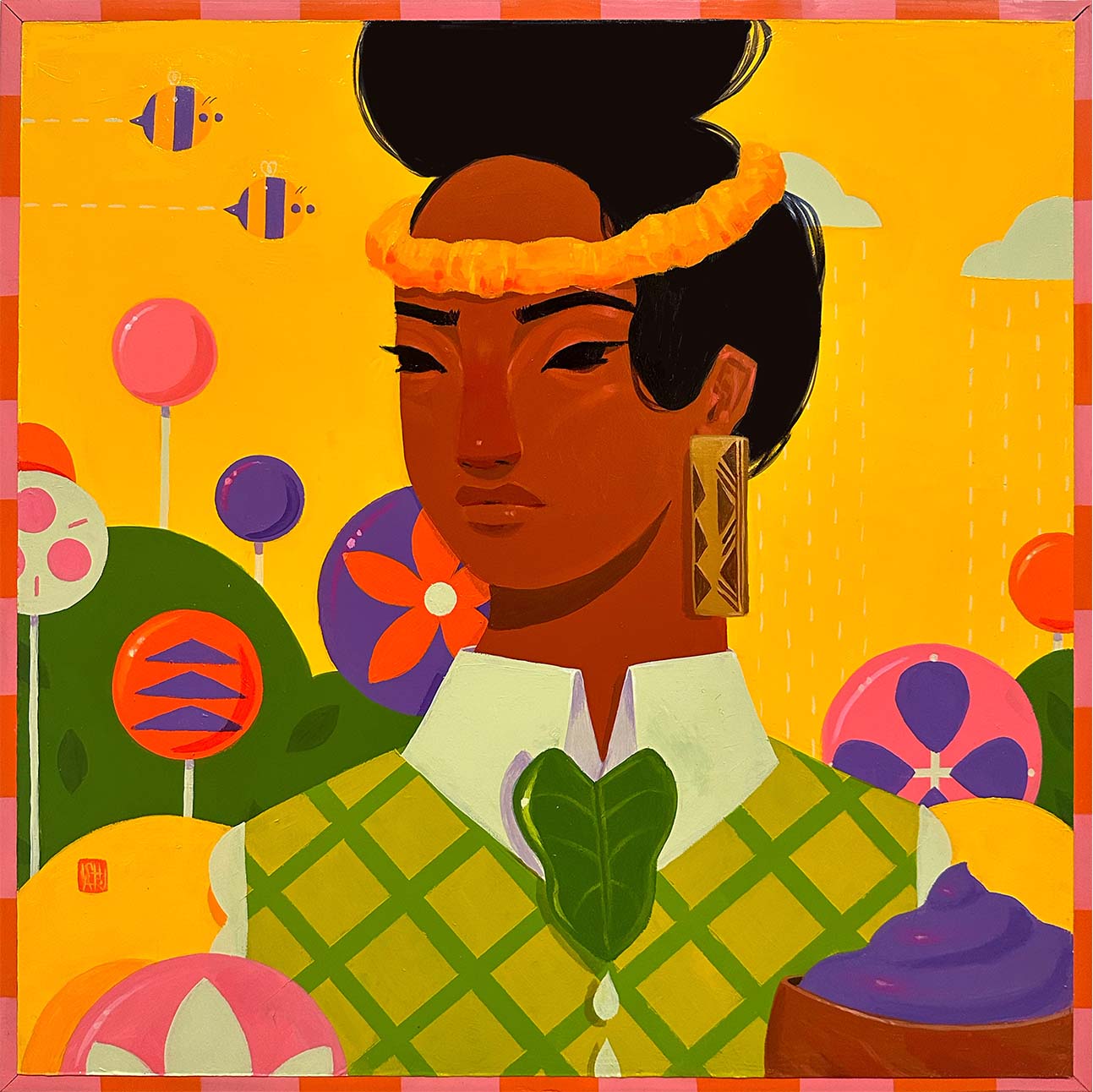

Seven years after starting Punky Aloha, Tuiasoa is in a near-perfect position for an artist. For one, she’s able to sustain a living by creating artwork for local and international brands (what she calls her “bread and butter”), but despite her signature style, commissioned work isn’t feeding her soul. So when Thinkspace Gallery in Los Angeles approached Tuiasoa in 2024 about exhibiting her work, she jumped at the opportunity.
The result was her debut solo exhibition, Time Before Us, a collection of 10 acrylic paintings, three of them displayed in poplar wood frames hand carved by Kumu William Miki Kalaniopio Cook. Each work depicted a female portrait of a Pacific Islander value, practice, or resource.
The show’s title refers to the Pasifika concept of kuonga maʻa, a perspective that sees the future as behind us and the past in front. “That was really what sparked the entire body of work,” she says. “It was just the intertwining of the past and the future and how important the past is to our people and the way we view it. I really wanted to see how I could try and visually explain that or celebrate that more.”
Having Pasifika characters and artwork put on a global scale or a national scale, that’s extremely important.
Shar Tuiasoa
Free of any corporate expectation or client approvals, Tuiasoa felt liberated to lean into her fantastical nerdiness, geeking out about Pasifika easter eggs hidden within the works; for example, the lollipops in the background of The Mei ʻAi Maker are really Polynesian symbols of food, and the lacework around the figure’s neck in Guidance features a tapa pattern for the tavake, or white-tailed tropicbird, also known as koa‘e kea in Hawaiian. “There were some fashion elements to it, but everything, every element in there had a deeper meaning and history to it,” she says. “If you ask a question about it, I can tell you something new about our culture.”
When the show opened last August, the weight of Tuiasoa’s accomplishments were not lost on her. Just over a decade had passed since she moved from Kailua to attend Laguna College of Art and Design. With her dreams of becoming a studio animator and comic strip artist, along with her daughter, partner at the time, and a surfboard in tow, the small clan initially slept in her car when they first moved to the continent, barely scraping by. Fast forward to now, and Tuiasoa is flying to her own debut exhibit, and by the time she lands in Los Angeles, the gallery will have called her to say that her entire show is already sold out.
The actual opening, then, was a true celebration of her journey as an artist, dating back to being a toddler on her mother’s hip as she attended fine artist Snowden Hodges’ classes at Windward Community College, later becoming Hodges’ student herself. “When you teach [art] for a long time, you know when people come in and they’ve already got a jump on it, but it was just natural to her,” Hodges says. “She was a born artist. She had ideas, and she was very creative, and just really a bright girl.”


Tuiasoa lights up as she recalls seeing Polynesians fill up Thinkspace, almost like a crowded scene she might create for one of her Punky Aloha art pieces. “For my family that lives up there to come see the show and to bring me lei, and to have my gallery just filled to the brim with really loud Polynesians chee-hooing and being just the most — it just meant so much to me,” Tuiasoa says.
Weeks later, in the backyard studio of her Keolu Hills home, not far from where she grew up in Enchanted Lakes, Tuiasoa is still reeling from the happiness of that day. Amid the rustling of surrounding palms and infrequent barks of her poi dog, Kalo, she’s entering a new chapter in her career. Besides booking more galleries, Tuiasoa wants to commit more time to her Punky Aloha Scholarship for Pasifika Creatives that awards $7,500 of her own money to Pacific Islander creatives.
Also on her list is to be more assertive in telling her own story, advocacy included. Art should never be separated from personal or political feelings, Tuiasoa believes, even at one’s own expense. “It’s scary to think I might not get hired, but you have to look at yourself in the mirror at the end of the day and think, ʻListen, if me sticking up for reproductive rights or for trans rights or Palestine means it costs me a job, those are just companies I don’t want to work with,” she says. “I’m not constantly making activist artwork, but for what I have made, I’ve never been without work.” With that, in the sacred space of her studio, Tuiasoa takes a brief moment for herself to tighten her topknot. She whips her head down to gather her hair, sweeps it all back up with a practiced rotation of the wrist, and punctures her locks with a pin right in its side. The artist is ready for whatever comes next.
(Except for the headline, this story has not been edited by PostX News and is published from a syndicated feed.)

